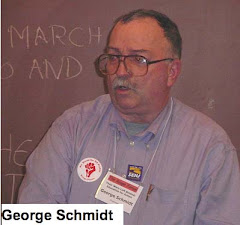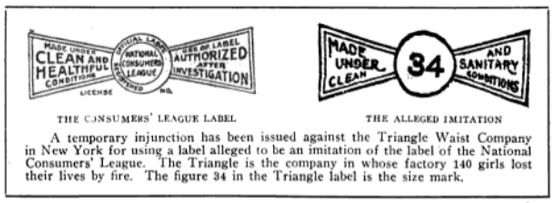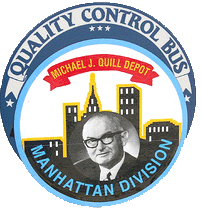The Triangle Waist Company, New' York, was last week temporarily enjoined from using on its goods a label declared to be imitative of that of the National Consumers' League.
This is the same Triangle Waist Company in whose factory a fire killed 140 girls in 1911—it being afterward proved that doors leading from the factory, which was on the ninth floor of a loft building, had been locked.
It is the same Triangle Waist Company that, two years and six months later, was again convicted of having its doors locked, and whose head, Max Blanck, was given the minimum fine on the ground that he was a first offender.
The National Consumers' League authorizes manufacturers to use its label only after investigation has showed that the goods on which it is to be used are made under "clean and healthful" conditions. The Triangle company has never been authorized to use its label.
The label declared to be an imitation, which is here reproduced, was first discovered by the Consumers' League last spring on some goods in a Boston department store. The buyer of the store told a representative of the league that he was buying waists with the league's label on.
It required several months to trace the label to the Triangle Waist Company. An effort was then made to induce employes of the Triangle company to sign' affidavits declaring that the suspicious label was used by that concern. The employes' fear of being blacklisted among manufacturers frustrated this.
A few weeks ago' the Consumers'
League served the Triangle Company with a summons and complaint in an action for a permanent injunction and with motion papers for an injunction pending trial, until final decision could be reached, which will not be till next winter. The league's action is based on the common law rules governing unfair trade and unfair competition. The label is not a registered trademark.
The Triangle company, in its answer, admitted the use of the label, but declared that it had not intended to imitate any other label, and denied knowledge of the existence of the National Consumers' League. It also questioned the right of the league to sue, on the ground that the league is not a manufacturer of shirt waists with a financial stake involved in the protection of its label, and therefore cannot invoke the common law rules cited above.
In granting the temporary injunction. Justice Leonard A. Giegerich, of the Supreme Court of New York county, declared that he was satisfied that the Triangle Company's label was an illegal imitation. While it is felt that this decision strongly presages the granting of the permanent injunction, it is pointed out that the question of law involved is a new one.
The nearest parallel case is said to be that of labor unions, which have been granted injunctions in behalf of their labels. These decisions have, however, rested on the ground that the members of the union had a financial stake, i. c. their wages, involved.
The league contends that it is but a logical extension of the "financial stake" theory to protect it in the use of its label. In anticipation of just this point, however, Bertha Rembaugh, attorney for the league, joined both a manufacturer of waists and a retail store in the action against the Triangle Company. These concerns, it is contended, have a financial interest in the protection of the league's label because their own sales would be affected by its fraudulent imitation. Should the case go against the league, it is feared that the opening which this would give to the imitation of the league's label would go far to destroy the effectiveness of the league's label work.
Friday, January 28, 2011
Look For The Union Label...The Tainted History of The Triangle Shirtwaist Company
from the Survey of August 18, 1914 with a h/t to Jane Fazio-Villeda
Posted by David Ballela at 10:43 AM
Labels: triangle shirtwaist fire
Subscribe to:
Post Comments (Atom)































0 Comments:
Post a Comment